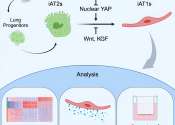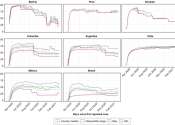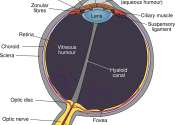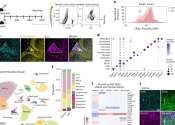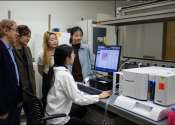Last update:
Neuroscience
Why do we move slower the older we get? New study delivers answers
It's one of the inescapable realities of aging: The older we get, the slower we tend to move—whether we're walking around the block or just reaching for the remote control.
1 hour ago
0
0
Psychology & Psychiatry
Study finds suicidal behaviors increased by over 50% in Catalonia, Spain after the COVID-19 pandemic
The COVID-19 pandemic has sparked extensive discussions about its effect on mental health. While global suicide rates remained stable during the pandemic, the specific impact on non-lethal suicidal behaviors, namely, ideation ...
31 minutes ago
0
0
Medical research news
Stress activates brain regions linked to alcohol use disorder differently for women than men, finds study
When exposed to stress, people with alcohol use disorder engage parts of the brain associated with both stress and addiction, which may cause them to drink or crave alcohol after a stressful experience, suggest the authors ...
1 hour ago
0
0

Chemical tool illuminates pathways used by dopamine, opioids and other neuronal signals
University of Michigan researchers have developed a new tool to better understand how chemicals like dopamine and epinephrine interact with neurons.
1 hour ago
0
2

Higher light levels may improve cognitive performance
Exposure to higher levels of light can help people feel more awake and increase cognitive performance, probably by influencing the activity of parts of a brain region called the hypothalamus, according to new research.
2 hours ago
0
40
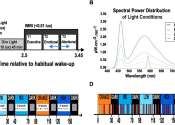
Gut microbiota acts like an auxiliary liver, study finds
Microbes in the mammalian gut can significantly change their hosts' amino acid and glucose metabolism, acting almost like an extra liver, according to a new preclinical study by Weill Cornell Medicine investigators.
2 hours ago
0
31
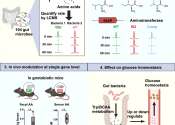
Brain neurons re-entering the cell cycle age quickly and shift to senescence, particularly in neurodegenerative disease
Post-mitotic neurons in the brain that re-enter the cell cycle quickly succumb to senescence, and this re-entry is more common in Alzheimer's disease, according to a new study published April 9 in the open-access journal ...
3 hours ago
0
16
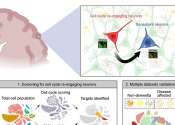
Gentle defibrillation for the heart: A milder method developed by researchers for cardiac arrhythmias
Using light pulses as a model for electrical defibrillation, Göttingen scientists developed a method to assess and modulate the heart function. The research team from the Max Planck Institute for Dynamics and Self-Organization ...
2 hours ago
0
0

Study reveals insights into DDX41 protein's role in blood cancer pathogenesis
A study led by Professors Hongtae Kim and JaYil Lee from the Department of Biological Sciences, in collaboration with researchers from the Catholic University of Korea, sheds light on the pivotal role of mutated DDX41 protein ...
4 hours ago
0
32

Study suggests that living near green spaces reduces the risk of depression and anxiety
Over the past decades, a growing number of people have migrated to urban areas, while the size and population of rural areas have drastically declined. While parks and other green spaces are often viewed as beneficial for ...

Q&A: Research shows neural connection between learning a second language and learning to code
As computer programming becomes an increasingly valued skill in the workforce, there is a greater need to understand how people learn to code most effectively.
2 hours ago
0
1

Innovative microscopy demystifies metabolism of Alzheimer's
Alzheimer's disease causes significant problems with memory, thinking and behavior and is the most common form of dementia, affecting more than 50 million people around the world each year. This number is expected to triple ...
4 hours ago
0
16

Magic mushrooms can treat medication-resistant depression—but are they safe?
New research suggests psilocybin has similar side effects to traditional antidepressants. Commonly referred to as "magic mushrooms," psilocybin is a promising alternative treatment for people with medication-resistant depression ...
5 hours ago
0
18

Liver cancer: Molecular signaling pathway of tumor development decoded
As a malignant disease of the liver cells, hepatocellular carcinoma (HCC) is one of the main causes of cancer-related deaths. While the treatment options for this aggressive type of cancer remain limited, the incidence is ...
5 hours ago
0
10

Charting brain synchronization patterns during social interactions
We experience the world and connect with others through social interactions. Engaging in activities, such as conversations, cooperative tasks, and intimate relationships, deeply affect brain activity leading to coordinated ...
5 hours ago
0
22

Proposed changes to Medicare, Medicaid could cost thousands of lives, study finds
Proposed changes to the United States' Medicare and Medicaid programs could lead to thousands of additional deaths each year, a new Yale study reveals. The study was published April 22 in the Proceedings of the National Academy ...
6 hours ago
0
21

New insights into the molecular mechanisms behind the action of secretagogin
An international research team, led by Tibor Harkany and Robert Schnell at Karolinska Institutet and MedUni Vienna's Center for Brain Research, set out to find ways of influencing hormone release to reduce stress reactions ...
6 hours ago
0
11

What if flat feet were normal? Debunking a myth about injuries
For many decades, if not centuries, researchers, medical professionals and the general population have believed that people with flat feet are more prone to developing a variety of problems.
3 hours ago
0
0

Unraveling the neural circuit behind reduced food intake in high temperatures
In a study recently published in Nature, an international research team led by Karolinska Institutet and MedUni Vienna, addressed how and why acute heat exposure, in conditions reminiscent of a sauna session or limited exposure ...
6 hours ago
0
15

Study reveals alarming rates of pediatric injuries from mechanical bull riding
A study conducted by researchers at Loma Linda University Children's Health has shed light on the alarming rates of pediatric injuries resulting from mechanical bull riding. The study, titled "Mechanical Bull Injuries in ...
3 hours ago
0
0





















